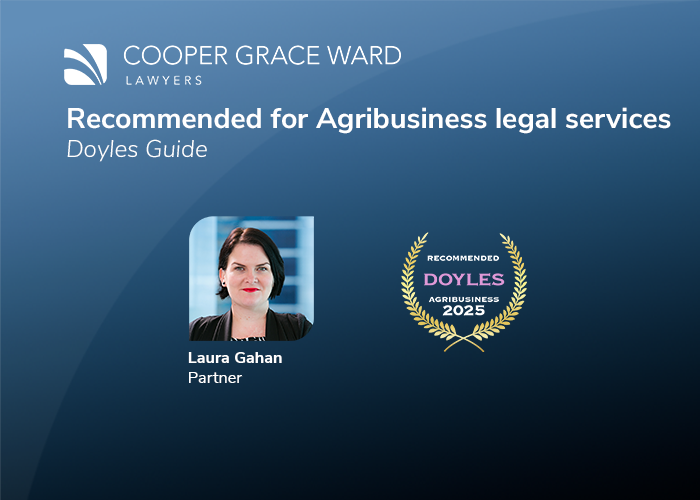In this edition of ‘It depends’, partner Sarah Lancaster talks about whether you need to pay compulsory superannuation contributions to your contractors.
VIDEO TRANSCRIPT
Hi, welcome to another episode of It Depends. I’m Sarah Lancaster, a partner in the private clients team at Cooper Grace Ward and today we’ll be looking at whether or not you need to pay compulsory superannuation contributions to your contractors.
Do I have to pay superannuation to my contractors?
It depends. Broadly, employers have to pay compulsory superannuation contributions on their employee’s ordinary time earnings. Now, when we’re unpacking that general obligation that exists to avoid paying the superannuation guarantee charge, it’s important that we understand who an employee is for the purposes of the superannuation guarantee legislation.
Who is an employee for superannuation purposes?
Under the legislation, a person who is an employee at common law will also be an employee for the purposes of the superannuation guarantee legislation. However, the act also includes an extended definition of employee, which will deem particular individuals and contractors in some circumstances to be employees. Without going into that extended definition in detail, one of the examples is where a person is engaged wholly or principally for their labour. In those circumstances, that person will be deemed to be an employee for the purposes of superannuation guarantee.
What is a contract wholly or principally for labour?
So, the first step is to consider whether or not a contract of service exists. If it doesn’t, we then need to look at whether or not there’s a contract wholly or principally for the labour of a person. Now, the cases make it quite clear that if a person’s been engaged under a contract for a result, then that will not be a contract that’s wholly or principally for their labour. Whether or not you have a contract for a result will exist on a lot of different facts and circumstances of the case. But broadly, where you have a contractor who is able to fulfill the performance and services under an agreement to in whatever way that they deem necessary, then you might have a contract for a result. We need to be looking at things like whether or not the contractor has the ability and right to delegate the performance of work under the contract to others and whether or not, for example, they’re getting paid a fixed fee at the end of the contract or whether or not they’re getting paid on an hourly basis for their labour.
What is the ATO’s view?
Very helpfully, the ATO have a ruling that’s right on point on these issues, it’s SGR 2005/1. Without going into detail into the ruling the ATO will find that there is a contract that’s wholly or principally for the labour of a person where three factors are present. Firstly, the person is remunerated for their skills and labour. Secondly, that person performs the services under the contract themselves and doesn’t have a right to delegate. And thirdly, that there is no contract for a result. Now, quite importantly, we need to have all three factors on the ATO’s view for there to be a contract that’s wholly or principally for labour.
What happens if I have missed this issue?
Consequences can be quite serious for employers who miss this issue, keeping in mind that it is quite a technical issue. So, the first problem is that the ATO has no limitation period for when they can issue an original assessment for the superannuation guarantee charge. So, we can often be dealing with superannuation guarantee charge liabilities that go back for a number of periods. The second issue is that as well as the underlying superannuation guarantee charge liability, the legislation also imposes an additional penalty on top of that underlying liability. Before the superannuation guarantee amnesty period ended in September 2020 the commissioner had a broad discretion to remit those additional penalties. But since that amnesty period has finished, the commissioner’s power to remit the additional penalties has been significantly limited.
If you want to discuss any of these issues in more detail, please give me or a member of our team a call.




